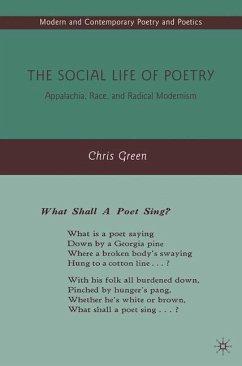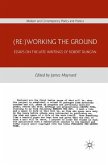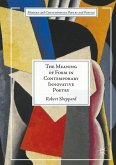From Jewish publishers to Appalachian poets, Green s cultural study reveals the role of "Mountain Whites" in American racial history. Part One (1880-1935) explores the networks that created American pluralism, revealing Appalachia s essential role in shaping America s understanding of African Americans, Anglos, Jews, Southerners, and Immigrants. Drawing upon archival research and deft close readings of poems, Part Two (1934-1946) delves into the inner-workings of literary history and shows how diverse alliances used four books of poetry about Appalachia to change America s notion of race, region, and pluralism. Green starts with how Jesse Stuart and the Agrarians defended Southern whiteness, follows how James Still appealed to liberals, shows how Muriel Rukeyser put Appalachia at the center of anti-fascism, and ends with how Don West and the Progressives struggled to form interracial labor unions in the South.
"The Social Life of Poetry makes a significant contribution to the contemporary study of race and place as it historically maps the cultural circulation of works by four poets writing about Appalachia. Not only does this book fill a gap in recent whiteness studies, it also offers valuable insights and specific examples for anyone working on such topics as cultural pluralism, modernist literary networks, U.S. publishing history, poetry s rhetoric, identity politics, and intersections of race and class. In this incisive exploration of geographic cultural politics, Green has given us a comprehensive model for rigorously studying the social life and material history of regional poetry in relation to national circuits of production, distribution, and reception." - Steven Mailloux, President s Professor of Rhetoric, Loyola Marymount University
"In this masterful assessment of the role of poets and poetry in social discourse, Green has much to say about regionalism, cultural pluralism, and racial politics in the ever-shifting intellectual movements and publishing trends of the 1930s and 1940s, and about the peculiar place of Appalachians within those far-removed worlds. Never have we seen the mountain South and its literature portrayed on so large a canvas or in so compelling a context. A provocative, insightful and utterly original contribution to both Appalachian and American Studies." - John C. Inscoe, Professor of History, University of Georgia, and Author of Race,War and Remembrance in the Appalachian South
"Green's book opens a window on a compelling and forgotten terrain in modern culture - the relationship between east coast modernism and the mountains of Appalachia. He deals powerfully with cultural interchanges and with Appalachia's own literary productivity, culminating in a beautiful chapter on Don West." - Cary Nelson, Author of No University is and Island: Saving Academic Freedom
"In this masterful assessment of the role of poets and poetry in social discourse, Green has much to say about regionalism, cultural pluralism, and racial politics in the ever-shifting intellectual movements and publishing trends of the 1930s and 1940s, and about the peculiar place of Appalachians within those far-removed worlds. Never have we seen the mountain South and its literature portrayed on so large a canvas or in so compelling a context. A provocative, insightful and utterly original contribution to both Appalachian and American Studies." - John C. Inscoe, Professor of History, University of Georgia, and Author of Race,War and Remembrance in the Appalachian South
"Green's book opens a window on a compelling and forgotten terrain in modern culture - the relationship between east coast modernism and the mountains of Appalachia. He deals powerfully with cultural interchanges and with Appalachia's own literary productivity, culminating in a beautiful chapter on Don West." - Cary Nelson, Author of No University is and Island: Saving Academic Freedom








